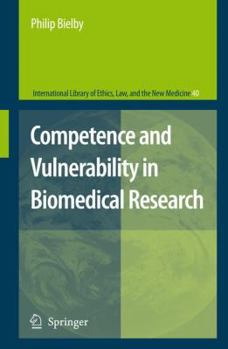Competence and Vulnerability in Biomedical Research
(Book #40 in the International Library of Ethics, Law, and the New Medicine Series)
Select Format
Select Condition 
Book Overview
Acknowledgments; Contents; Main abbreviations; Note on the text; Introduction; Chapter One; Five concepts of competence;Agency competence; Task competence;Societal competence;Decisional competence;Risk-relative (asymmetrical) competence;Decision-relative competence;Legal competence;First sense of legal competence (first person contemporaneous legal competence);Second sense of legal competence (delegable legal competence);Third sense of legal competence (fiduciary legal competence) Chapter Two: Consent, vulnerability and research;Competence to give informed consent;Individual autonomy;Why biomedical 'research'?;The evolution of the rights of research participants;The meaning of vulnerability;Cognitive vulnerability and consent to biomedical research;Why conduct biomedical research with cognitively vulnerable groups?; Chapter Three: Gewirth's theory of agency rights;The argument to the PGC;The methodology of the PGC;Defining the content of agency rights;Resolving conflicts of rights under the PGC;Direct and indirect applications of the PGC;Consent and the PGC;An evaluation of the PGC against two alternative rationalist ethical theories;(i) John Rawls;(ii) David Gauthier;Summary; Chapter Four: Proportionality, precaution and judgments of competence;The Principle of Proportionality (PP);Precautionary reasoning;Ostensible agents;Apparent partial agents;Ostensible intermittent agents;Evidence of agency and duties of protection;The criterion of avoidance of more probable harm;Degrees of displaying GCAb and its relationship with task and decisional competences;Ostensible agents;Ostensible intermittent agents;(i) Ostensible intermittent agents who are close to having the capacities needed to be an agent in a standing fashion;(ii) Ostensible intermittent agents who are less close to having the capacities needed to be an agent in a standing fashion;Apparent partial agents;Summary; Chapter Five: The competences of cognitivelyvulnerable groups;Older children and adolescents;Adults with intellectual disabilities;Adults with depression;Adults with schizophrenia;Adults with Alzheimer's disease and other dementias;Summary; Chapter Six: Cognitive vulnerability and consent to biomedical research;Decisional competence and supported decision-making;Older children and adolescents;Adults with intellectual disabilities;Adults with depression;Adults with schizophrenia;Adults with Alzheimer's disease and other dementias;Summary; Chapter Seven: Cognitive vulnerability and consent to biomedical research in England and Wales;Three approaches to determining FPCLC;The meaning of FPCLC consent in England and Wales;Adults;Children;Problems surrounding the use of capacity;Towards supported decision-making?;The significance of European regulation of capacity;Ethical guidance on decisional competence in biomedical research in the UK;Summary; Chapter Eight: Cognitive vulnerability and consent to biomedical research in the United States;The meaning of competence and capacity in the United States; Federal law;State law;Policy documents on decisional competence;Making Health Care Decisions 1982);Research Involving Individuals with Questionable;Capacity to Consent (1997);Research Involving Persons with Mental Disorders;That May Affect Decisionmaking Capacity (1998);NIH Policy and Guidelines on the Inclusion of Children as Participants in Research Involving Human Subjects (1998);Summary; Conclusion;References
Format:Hardcover
Language:English
ISBN:1402086032
ISBN13:9781402086038
Release Date:September 2008
Publisher:Springer
Length:236 Pages
Weight:1.17 lbs.
Dimensions:0.6" x 6.1" x 9.2"
Related Subjects
Bioengineering Biomedical Engineering Ethics & Morality Medical Medical Books PhilosophyCustomer Reviews
0 rating





